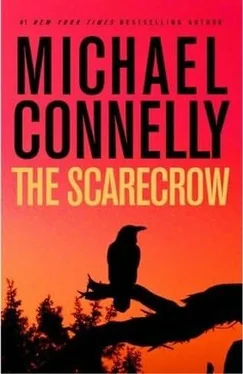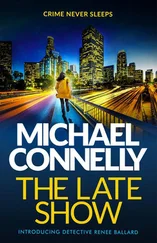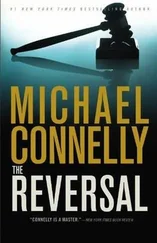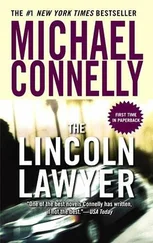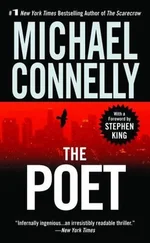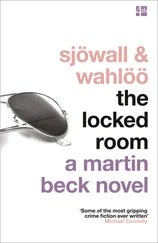However, I had neglected to tell Angela about these options. And with her spending the morning at Parker Center and my spending it chasing the Babbit case, nobody had gotten any bells or whistles, and nobody had made the old-fashioned manual checks.
I started scrolling backward on the CNS screen, looking for anything about a police press conference or any other breaking crime news. My call to Grossman was answered by a secretary but she told me the captain was already upstairs-meaning the sixth floor-at a press conference.
Just as I hung up, I found a short blurb on CNS announcing the eleven A.M. press conference in the sixth-floor media room at Parker Center. There was little information other than to say it was to announce the results of a major drug sweep conducted through the night in the Rodia Gardens housing complex.
Bang . Just like that, my long-term story was hooking nicely into a breaking story. The adrenaline kicked in. It often happened this way. The daily grind of the news gave you the opening to say something bigger.
I called Angela back.
“Are you on six?”
“Yeah, and they haven’t started. What’s this about? I don’t want to ask any of these TV people, because then I’ll come off as stupid.”
“Right. It’s about a drug sweep overnight in Rodia Gardens.”
“That’s it?”
“Yeah, but it could go big because it’s probably in response to the murder I told you about yesterday. The woman in the trunk was traced back to that place, remember?”
“Oh, right, right.”
“Angela, it connects with what I’m working on, so I want to try to sell it to Prendo. I want to write it because it will help set up my story.”
“Well, maybe we can work on it together. I’ll get as much as I can here.”
I paused but not too long. I had to be delicate but decisive.
“No, I’m going to come over for the conference. If it starts before I get there, take notes for me. And you can feed them to Prendo for the web. But I want this story, Angela, because it’s part of my larger story.”
“That’s cool, Jack,” she said without hesitation. “I’m not trying to bogart the beat. It’s still your baby and the story is yours. But if you need anything from me, just ask.”
I now thought I had overreacted and was embarrassed at having acted like a selfish prick.
“Thanks, Angela. We’ll figure it out. I’m going to give Prendo a heads-up on this for the daily budget and then I’ll be over.”
Parker Center was in its last months of life. The crumbling building had been the command center for police operations for nearly five decades and was at least one decade past obsolescence. Yet it had served the city well, seen it through two riots, countless civil protests and major crimes, and had been the location of thousands of press conferences like the one I was going to attend right now. But as a working headquarters it was long outdated. It was overcrowded. Its plumbing was shot and its heating-and-air-conditioning system almost useless. There weren’t enough parking spots, office space or jail cells. There were known areas in hallways and offices where the air was tainted and sour. There were buckles in the vinyl flooring, and the structure’s prospects of surviving a major earthquake were questionable. In fact, many detectives tirelessly worked cases on the street, pursuing clues and suspects to extraordinary lengths, just so they wouldn’t be in the office when the big one hit.
A beautiful replacement was weeks from completion on Spring Street, right next to the Times . It would be state of the art and spacious and technologically savvy. Hopefully, it would serve the department and the city for another five decades. But I would not be there when it was time to move in. My beautiful replacement would be the one, and as I rode the rickety elevator up to the sixth floor I decided that this was how it was meant to be. I would miss Parker Center precisely because I was like Parker Center. Antiquated and obsolete.
The press conference was in full swing when I got to the big media room next to the chief’s office. I pushed past a uniformed officer in the doorway, grabbed a copy of the handout from him and ducked under the line of cameras-a reluctant courtesy-along the back wall and took an open seat. I had been in this room when it was standing room only. Today, with the bottom line being that the PC was about a drug raid, the attendance was perfunctory. I counted representatives from five of the nine local TV channels, two radio reporters, and a handful of print people. I saw Angela in the second row. She had her laptop open and was typing. I assumed she was online and filing for the web edition even as the press conference was still under way. She was a mojo tried-and-true.
I read the handout to get up to speed. It was one long paragraph, designed to set forward the facts, which the police chief and his top narc could elucidate further during the press conference.
In the wake of the murder of Denise Babbit, presumed to have occurred somewhere in the Rodia Gardens Housing Project, the LAPD’s South Bureau Narcotics Unit conducted one week of high-intensity surveillance of drug activities in the housing project and arrested sixteen suspected drug dealers in an early morning sweep. The suspects included eleven adult gang members and five juveniles. Undisclosed amounts of heroin, crack cocaine and methamphetamine were seized during raids on twelve different apartments in the housing project. Additionally, Santa Monica police and investigators with the District Attorney’s Office executed three search warrants in regard to the murder investigation. The warrants sought additional evidence against the 16-year-old charged with the murder as well as others who may have been involved.
Having read thousands of press releases over the years, I was pretty good at reading between the lines. I knew that when they didn’t disclose the amounts of drugs seized it was because the amounts were so low as to probably be embarrassing. And I knew that when the press release said the warrants sought additional evidence, then the likelihood was that none had been found. Otherwise, they would have trumpeted the fact that more evidence was gathered in the execution of the warrants.
All of this was of mild interest to me. What had my adrenaline moving was the fact that the drug sweep was in response to the murder and it was an action that was sure to instigate racial controversy. That controversy would help me sell my long-term story to my own command staff.
I looked up at the podium just as the chief was passing the lead to Grossman. The captain stepped up to the microphone and started the narration that went along with a PowerPoint presentation of the sweep. On the screen to the left of the podium, mug shots of the arrested adults started flashing, along with listings of the charges against each individual.
Grossman got into the specifics of the operation, describing how twelve teams of six officers each simultaneously raided twelve different apartments at six-fifty in the morning. He said there was only one injury and that was to an officer who was hurt in a bizarre case of being in the wrong place at the wrong time. The officer was hurrying down the side of one of the project buildings to cover the rear, when the suspect inside was awakened by pounding on his front door. The suspect threw a sawed-off shotgun out the window so as not to be in possession of the illegal weapon. It struck the passing officer in the head, knocking him unconscious. He was treated by paramedics and would be held overnight for observation in an undisclosed hospital.
The mug shot of the gangbanger who had extorted fifty dollars from me the day before flashed on the screen. Grossman identified him as twenty-year-old Darnell Hicks and described him as a “street boss” who had several younger men and boys working for him selling drugs. I felt a small amount of joy seeing his face up there on the big screen and knew I would put his name first among the arrested when I wrote the story for tomorrow’s paper. That would be my way of doing the Crip walk right back at him.
Читать дальше
